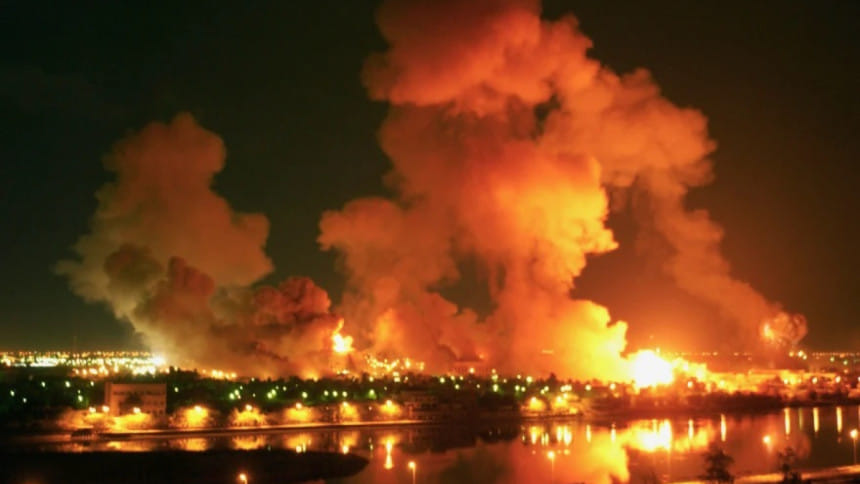Reflections on America’s marketing of war

During the mid-1980s, I was an MBA student at George Washington University. I used to take a transfer bus at a stop next to the White House to go to school. Lafayette Park, opposite the White House, was an open free speech area for demonstrators and protestors. It was also the residence of a few homeless inhabitants. The security perimeter of the White House was much smaller; and it was not as strict as it is now. It is still a free speech area.
War was not a serious issue at that time. A middle-aged lady used to sit there every day with placards seeking world peace and protesting against war. She was kind of a landmark in the park. No one bothered her and she bothered nobody. Despite the shabby looks of the park, the atmosphere was admirable. It was an attestation to the coexistence of diverse views, a testimony to America's freedom.
As a hegemonic superpower, America's primary concern has been its leadership position in the world; especially, economic leadership in global trade and investment. During the mid-1980s, when trade deficit with Japan increased to $60 billion, Americans were troubled. Japan bashing was common in popular press, very similar to what China is experiencing now. Japan was also praised for its system of governance, economic competitiveness, Confucian ethics, respect for hierarchy, and collectivism.
Historically, we have observed that in order to: (a) protect the empire, (b) retain economic competence, and (c) preserve territorial gains, hegemonic powers have maintained strong militaries. Paul Kennedy underscores this relationship in his The Rise and Fall of the Great Powers (1987). America is pursuing what empires have done traditionally. It is maintaining a presence in 750 military facilities in 80 countries/territories of the world. Foreign military bases are one of the pillars of the "American War Industry" (often described as the military-industrial-complex) whose size and power are unmatched by any other country. Comparatively, Russia has 21 and China has only one military base outside their countries.
The US war industry relies on a large number of private enterprises mostly funded by public money. It thrives on conflicts. Peace is an anti-thesis to war. Since World War II, America has fought quite a few wars in various parts of the world. None of these wars were fought on American soil. Foreign bases have provided strategic and tactical support to those international engagements. During the past three decades, it fought three major wars in Kuwait, Iraq, and Afghanistan. Ukraine is its latest engagement. Let us examine how the principles of marketing were applied to sell wars to the American public.
From a marketing perspective, a war must have a value-proposition, a principal argument backed by moral reasoning, teleological or utilitarian. Citizens must be convinced that war is necessary and beneficial to the nation. A tangible product benefit, an observable material outcome, helps the persuasion process. In my opinion, this was missing in the Vietnam war.
The fight for democracy or anti-communist arguments did not sell very well. The engagement was long drawn; there was no end in sight; cost was very high; and the number of body bags made the situation worse. Pictures of death, destruction, and suffering in the media undermined the government's moral reasoning. The naked girl (she lives in Canada now) running away from the American napalm bomb was hard to accept. The nation was divided. The US government was fighting two wars, one in Vietnam and the other at home against the protesters that included many returning soldiers.
Perhaps, the American government and the war industry learned their lesson in Vietnam. The Kuwait war was packaged. The government of Kuwait hired marketing/public relation companies to build support. Kuwait and the Gulf States shared the cost of war. US media gave favourable coverage. It was a short, decisive war. US casualty was low. There was voluntary and involuntary media control; we did not see Vietnam-style media coverage. Kuwait was liberated. America regained control over Kuwaiti oil. American public could see a tangible utilitarian outcome of the war. President Bush (41st) kept his promise (a limited objective), he did not remove Saddam Hussein. His post-war approval rating was 91 percent.
The Iraq war was marketed with a "weapons of mass destruction (WMD)" argument with Saddam Hussein portrayed as the villain. When WMD was not found, the narrative changed – "the world is better off without Saddam Hussein" was sold. America won the war with a "shock and awe" bombing campaign. American public did not see the evaporation of Iraqi neighbourhoods. Pictures of burnt, dismembered human corpses that accompanied the bombing would have been horrific. They were sanitised in the media. American army had a walk-over with low casualty. Today, Iraq is barely functioning as a nation state with three autonomous regions. America has control over the Iraqi oil (again, a tangible outcome). America has built a large military base near Baghdad to keep control.
The Afghan war was a little complex. When the Russians (Soviet Union) left, the Western media was in full praise of the Mujahedeen. The Afghans were also very thankful to the West. A post-war US reconstruction programme (a miniscule Marshall Plan) could have saved the nation and America could have gotten a great ally in the region. That did not happen. The withdrawal of the West created a vacuum. Slowly, the country slipped into a state of lawlessness. Later, the western intervention made the situation worse. Helpless Afghans returned to their faith, this time fighting against the Americans. Faith gave them the moral reasoning needed to continue the war. They controlled the countryside and had the determination ("will to fight", a critical component in war) to win. Geography and terrain were helpful. I think the West should take this new Afghanistan favourably and not fall into the same trap.
No one knows how and when the Ukraine war is going to end. On June 2, 2023, in Helsinki City Hall, Anthony Blinken, US Secretary of State stated that, "Russia is estimated to have suffered more than 100,000 casualties in the last six months alone, as Putin sends wave after wave of Russians into a meat grinder of his own making." Numbers could differ, but one could make the same argument against the Ukrainian government. Both governments are feeding the so-called meat grinder and the US government is allowing it to continue.
Are we observing a repetition of Vietnam in Ukraine? The value proposition of the war is not well defined; death and destruction are hard to take; there is no end in sight; and the cost is staggering. Funding a stalemate can only benefit the war industry. Without serious protest in the US, this war is not going to end. It may even result in a nuclear war. Lafayette Park will have to play its historic role with loud protests. That may advance diplomacy to the forefront.
Dr Abu Waheeduzzaman is a Professor of Marketing and International Business at Texas A&M University-Corpus Christi.

 For all latest news, follow The Daily Star's Google News channel.
For all latest news, follow The Daily Star's Google News channel. 








Comments